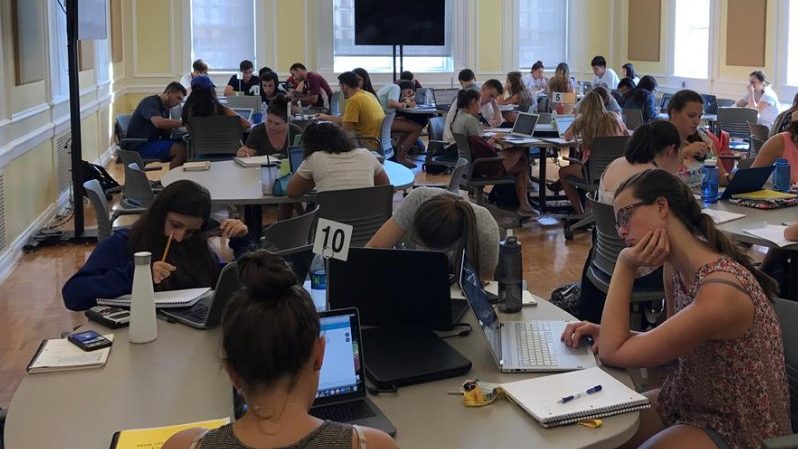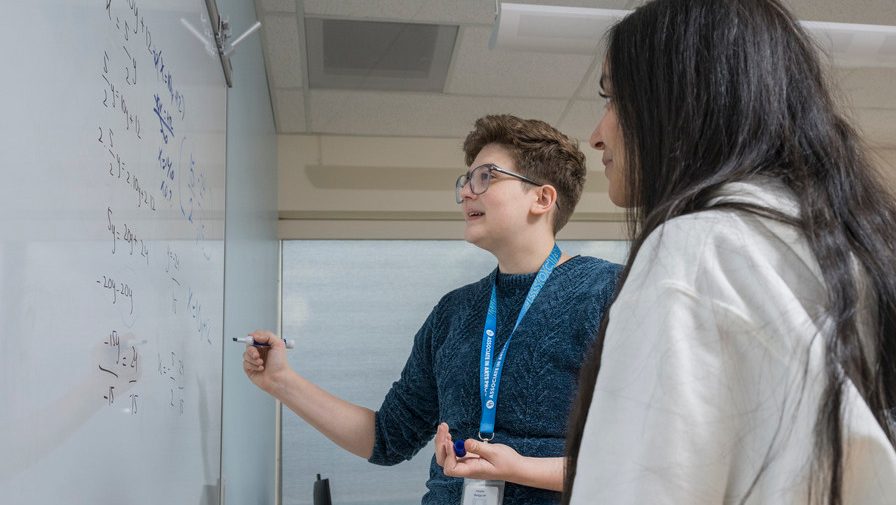
Math 231/232
Math 231/232 Integrated Calculus IA and IB
The information presented here is intended to describe the course goals for current and prospective students as well as others who are interested in our courses. It is not intended to replace the instructional policies and course materials presented in class.
The following information applies to the Newark campus.
Every effort is made to update this information on a routine basis. However, if you have questions about enrollment, purchasing materials, and prerequisite skills, please check with your advisor or instructor.
The most updated Course Description can be found at the UD Course Description Search. Information on the sections currently offered can be found at the UD Course Search. More information can be found on the departmental syllabus for MATH 231 and MATH 232.
Math 231/232 Integrated Calculus IA and IB is a two-semester course sequence that develops the core topics of Calculus I, with relevant and critical Pre-calculus topics woven in and developed alongside the calculus topics. Thus, this course sequence provides an alternative to the traditional Pre-calculus to Calculus (MATH 117 / MATH 241) pathway. Instead of first completing a full semester of Pre-calculus, Math 231 students begin to study Calculus topics immediately, and learn the necessary Pre-calculus topics along the way.
All MATH 241 topics are developed by the end of the two-semester course sequence, along with the necessary Pre-calculus topics from MATH 117.
Math 231: Integrated Calculus IA (first semester) – Topics
- Functions and key characteristics of functions
- The limit of a function
- Finding limits graphically and numerically
- Linear and piecewise-defined functions, and the absolute value function
- Composition of functions, transformations of functions, and inverse functions
- Polynomial functions
- Rational functions
- Calculating limits using limit laws
- Limits at infinity and horizontal asymptotes
- Continuity
- The tangent line problem
- Derivatives and rates of change
- Derivatives of polynomial and rational functions
- The Product and Quotient Rules
- The Chain Rule
- Implicit differentiation
- Related rates
- Linear approximations
- Maximum and minimum values
- The Mean Value Theorem
- Exponential functions
- Logarithmic functions
- Derivatives of exponential and logarithmic functions
- Exponential growth and decay
- How derivatives affect the shape of a graph
- Optimization problems
Math 232: Integrated Calculus IB (second semester) – Topics
- Antiderivatives
- Areas and Distances
- The Definite Integral
- The Fundamental Theorem of Calculus
- Indefinite Integrals and the Net Change Theorem
- The Substitution Rule
- Introduction to trigonometric functions
- Right triangle trigonometry
- Trigonometric functions of any angle
- Graphs of trigonometric functions
- Inverse trigonometric functions and their graphs
- Trigonometric applications and models
- Trigonometric identities
- Solving trigonometric equations
- Sum, Difference, and Double-Angle Formulas
- Limits of trigonometric functions
- Derivatives of Trigonometric and Inverse Trigonometric Functions
- Integration of Trigonometric and Inverse Trigonometric Functions
- Hyperbolic functions and their derivatives
- Models for population growth
- Predator-Prey systems (optional)
A strong algebra background is critical for success in this course. This includes the ability to perform operations with rational expressions and numerical fractions (without the use of a calculator), working with radicals and rational exponents, factoring polynomials, and solving equations. A minimum of two years of high school algebra is required. Pre-calculus or Algebra II in the senior year is preferred.
The following course materials are usually required in this course:
- Online math program for homework, access to the textbooks, and testing
- Course pack that includes class activities
Students should always check with their instructor before purchasing any course materials.
On the Newark campus during the regular semesters, Math 231 and Math 232 is taught in the Mathematical Sciences Learning Lab (MSLL). During much of the class, students work in small groups on activities that focus on concepts and connections between ideas. Students practice outside of class using an online homework system.
Math 231 meets four times a week, on a MTWF or MWRF schedule. Math 232 meets three times a week, on a MWF schedule. Typically, there are two out-of-class midterm exams and a cumulative final exam taken during Final Exam week.
This course is not offered during the short sessions (winter and summer).
There are several campus resources that provide additional assistance.
- Mathematical Sciences Learning Laboratory (MSLL) Open Lab: MSLL Open Lab provides free tutorial support for this course. The lab is staffed by qualified undergraduate students. This is a drop-in site – no appointment is needed. Students can work on their math homework, study for a math quiz or exam, and receive free tutorial assistance. More information can be found at the webpage: MSLL Open Lab
- Office of Academic Enrichment: Located at 148-150 South College Avenue, this site provides a number of different course resources for students. Please visit their website for more information.
This course is not available at the satellite campuses.


